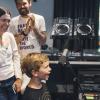
Bats sometimes get a bad rap—they are accused of being creepy, biting people and turning into the occasional vampire. But in reality, bats are amazing and incredibly important. Did you know they can eat up to 1,200 mosquitos per hour? It’s true!
If you want to learn more about—and appreciate—the world’s only flying mammal, you should. And you are in luck! Woodland Park Zoo has launched a new citizen science program called Bat Activity Trends. The program encourages community residents to participate in documenting bat activity in their own neighborhoods.
You can learn about and help bats by joining one of the following sunset meetups organized by Bat Activity Trends, or by registering to count bats in your neighborhood (more on that below).
Seattle-area bat events
Rainier Beach Urban Farm and Wetland
- When: Friday, Aug. 19, 7:30–9 p.m.
- Details: This event is free and there is no need to register; all ages welcome
- When: Wednesday, Aug. 24, 7:30 p.m.
- Details: Free event; register online. While this event says it’s “geared toward adults,” all ages are welcome.
Green Lake Park with Bats Northwest
- When: Thursday, Aug. 25, 7:30 p.m.
- Details: Meet by the Bathhouse Theater, 7312 W. Green Lake Drive N.; all ages welcome.
SAM Remix at Olympic Sculpture Park
- When: Friday, Aug. 26, 8 p.m.–midnight
- Details: This event is for the 21-and-older crowd, and tickets cost $30–$45. But with all kinds of dance, music and art performances, it’s a perfect end-of-the-summer date night, right? (Get a sitter and do it for the bats!)
- When: Saturday, Sept. 17, 6:30 p.m.
- Details: Free event, register online; check the website for more detail; all ages welcome.
Community bat count
To participate in the citizen science bat count, find all the info you’ll need on the Bat Activity Trends website, including how to sign up, what data to collect and submit, and—very important—how to tell a bat from a bird. There’s even an orientation video. More materials: a free, downloadable kid-friendly participation packet and data collection sheet. While an individual must be at least 13 years old to register, families can participate in gathering data together.
When you are sitting outside tonight enjoying these last warm weeks of summer, don’t forget to look up when the sun starts to set. As you grab a sweater or blanket, also put on your family’s citizen scientist hats and jot down the bats you see!











